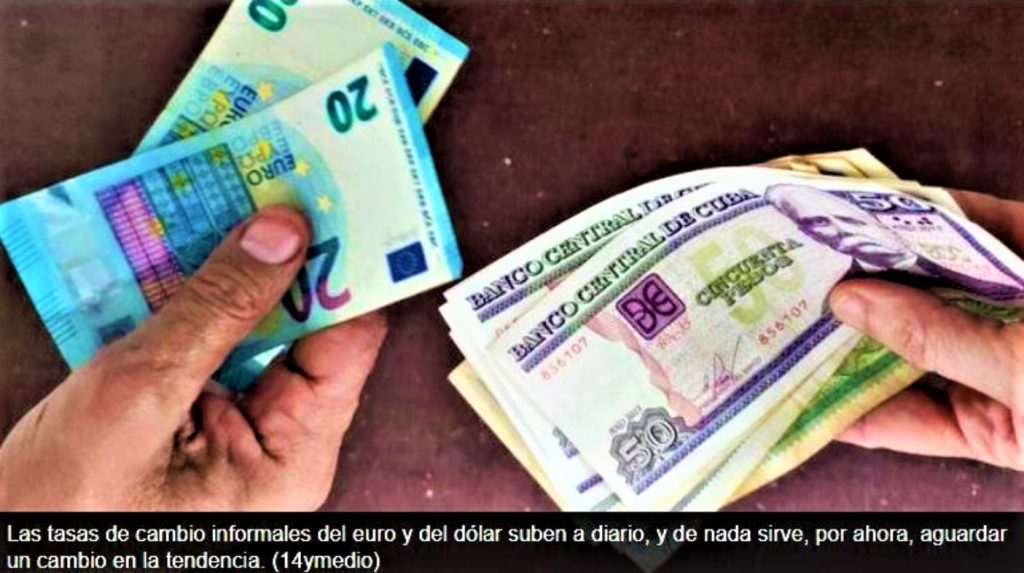La desesperación por migrar de la Isla aumenta la disposición de los cubanos a pagar más por las divisas
Natalia López Moya, La Habana

14 y medio, Enero 20, 2022
Articulo Original: Emigración el Euro y el Peso
Una avalancha de cubanos desesperados recorre las redes, en busca de divisas. La elevada demanda contrasta con una escasa oferta, lo que ha hecho que se disparen los precios tanto del dólar, que llega a alcanzar los 95 pesos, como del euro, que por primera vez en su historia se canjea a más de 100.
“Pago los euros a 101 CUP si son más de 2.000”, decía un anuncio este mismo jueves en uno de los grupos de clasificados cubanos.
La furia migratoria y el desespero por escapar de la Isla aumentan la disposición de los cubanos a pagar más por estas monedas extranjeras. Desde que el pasado 22 de noviembre, Nicaragua anunció el libre visado para los cubanos, miles se volcaron a la compra de divisas para pagar los altos precios de los pasajes a Managua, desde donde continuar camino hacia Estados Unidos.
Las tasas de cambio informales suben a diario, y de nada sirve, por ahora, aguardar un cambio en la tendencia. “Ayer estaba a 76 pesos el dólar, pero yo quiero esperar a que baje porque quiero comprar 10.000”, comentaba Aimara hace apenas dos semanas. “Lo vendí todo para poder irme vía Nicaragua, y tengo que sacar el mayor provecho a mi dinero, aunque si sigue subiendo tendré que comprarlos a como esté”, contó a 14ymedio. Los acabó comprando por 80, finalmente, hace unos días.
“Lo vendí todo para poder irme vía Nicaragua, y tengo que sacar el mayor provecho a mi dinero, aunque si sigue subiendo tendré que comprarlos a como esté”
Estos canjes, que se realizan al margen de la legalidad, conllevan, además, un riesgo, debido a la circulación de billetes falsos y las estafas. “Si voy a cambiar dinero siempre voy acompañado y con un marcador de billetes falsos”, cuenta a 14ymedio Raidel, un residente de Centro Habana que se dedica a este negocio hace ya unos meses. “Siempre intento que sea en mi casa, o que por lo menos no sea en barrios marginales, porque el riesgo de que te den una paliza para quitarte el dinero siempre está presente”, explica.
La reacción en cadena provocada por el alza en el precio del dólar ha elevado el valor del euro, y, por ende, también el del dinero virtual en las tarjetas en moneda libremente convertible (MLC). Esto también provoca una mayor inflación de los precios de algunos productos y servicios que se comercializan en el devaluado peso.

La MLC, moneda digital que inventó el Gobierno para vender en las tiendas en dólares alimentos y electrodomésticos, se compra a través de transferencias electrónicas utilizando aplicaciones como Transfermóvil o EnZona. En este caso, la compraventa se puede realizar de manera presencial o a distancia, si existe un elevado nivel de confianza entre las dos partes.
Se espera que los precios de las divisas sigan aumentando. Los pocos vendedores que aparecen en redes sociales y aplicaciones de mensajería, principalmente en grupos de compraventa de Facebook y Telegram, a modo de especulación, fuerzan la venta de los billetes pidiendo ser atendidos en el correo privado, y una vez allí los venden al mejor postor, como si se tratara de una subasta. “Los vendo al que mejor me los pague, no tengo apuro”, es una de las respuestas empleadas por estos comerciantes.
Los billetes de alta denominación y en muy buen estado son los más demandados porque suscitan más confianza y abultan menos para el traslado. No obstante, los compradores se enfrentan a las restricciones de entrada de efectivo que imponen muchos países, en los que el máximo permitido no debe superar los 10.000 dólares sin declarar. Algunos viajeros provenientes de la Isla han tenido problemas con sumas mayores a su entrada a Panamá, México y otros países de la zona.


